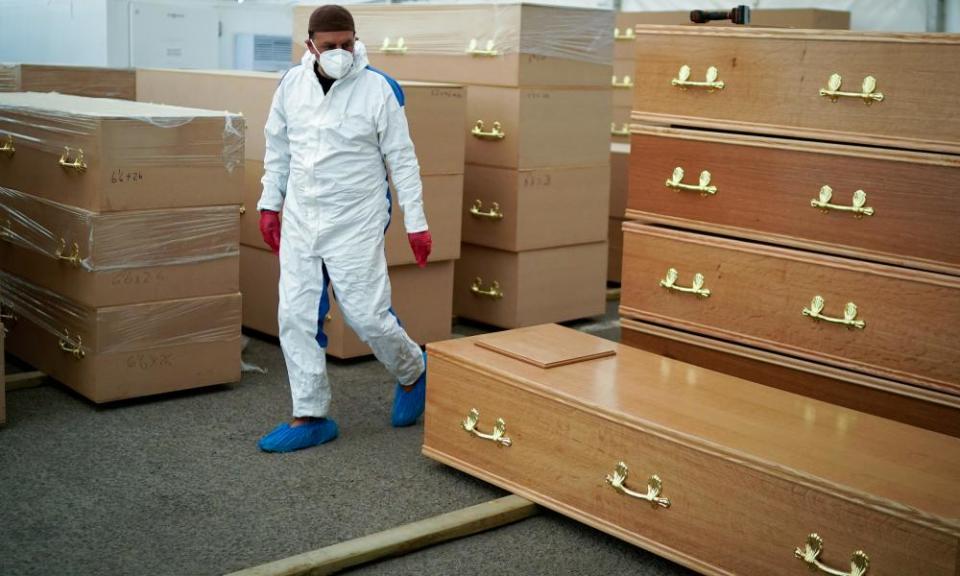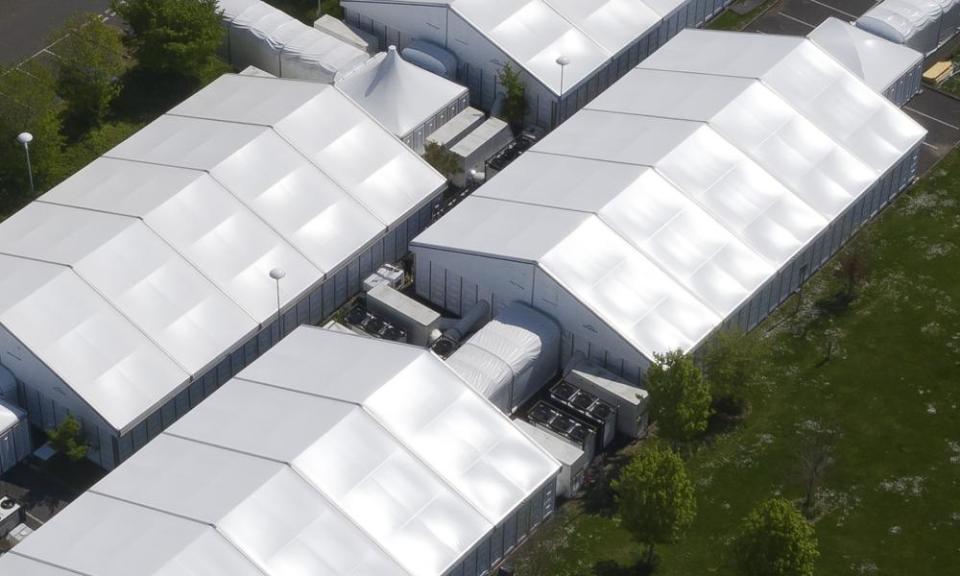Dealing with death: Covid's toll on UK crematoria and morgues

When the UK’s first victim of Covid-19 died on 5 March 2020, there were only 116 recorded infections in the country and few people countenanced a death toll of 100,000.
But for government planners it was different. Emergency response experts tasked with “mortality management” braced for a death toll that they feared would dwarf anything seen since the second world war. As fatalities mounted in China and Italy, the worst-case scenario for the UK was so grim that one scheme hatched involved storing thousands of bodies in a warehouse in east London.
Another was to anchor a ship in the Thames and load it with containers adapted to hold racks of bodies, a senior official who worked on the plans as part of London’s “gold command” told the Guardian. “It was incredibly chilling,” they said.
In Birmingham, plans were developed for a mortuary in an airport hangar, in Glasgow a warehouse on an industrial estate was primed, and in Cardiff the Welsh government began sourcing space to hold bodies amid fears of a worst-case death toll of 20,000.
Pre-prepared disaster plans for handling pandemics, natural disasters and terrorist attacks show London had 3,500 mortuary spaces. But the capital braced for the virus with an additional 12,000 mortuary spaces. If cemeteries could not cope, bodies would be frozen to await their final committal. There were plans to transport scores of bodies at a time between storage locations in trucks, the official said, a practice that risks misidentifying or even losing the dead.
There were moments when the system seemed to strain. Body bags ran out at one point and their price rose tenfold, which meant the armed forces had to give up some they had in reserve for battle casualties.
default
Officials said they wrestled with unforeseen difficulties, such as a backlog of bodies from the Greek Orthodox community whose families wanted them to be buried in Greece. That was not possible as flights were grounded.
In April, trench graves were dug in east London at the Eternal Gardens Muslim burial ground in Kemnal Park, south-east London, in response to high death rates and the religious mandate to bury bodies within 24 hours. It was a shocking but rare sight and in the end mortuary, burial and cremation facilities were stretched rather than overwhelmed. Neither London’s ship nor its warehouse were needed and the country coped with the practical realities of a death toll 19% higher than on average for the previous decade. Now it is being asked to respond again as officials once more handle a sharp rise in deaths.
A temporary mortuary with capacity for 672 bodies, and more if needed, is being prepared at Breakspear crematorium in Hillingdon, north London, while planners in Kent, Surrey and Lincolnshire have started storing bodies in temporary marquees to create space in crowded hospital mortuaries. In November, Lancashire county council erected a temporary storage unit for 210 bodies in a business park near Leyland, although it is yet to be used. In Birmingham, where Handsworth cemetery filled up after the first wave of coronavirus deaths, with Muslim plots running out fastest, burials are being redirected to open plots at Sutton New Hall on the north-east edge of the city.

Coroners’ courts, which run essential inquests into deaths, have also become backlogged, partly because the law requires that coroners are present in court for an inquest to be carried out and many have been closed because of Covid-19. In cases where inquests are required, families cannot receive death certificates until they are concluded.
“Lockdown has meant that many inquests have had to be adjourned or postponed,” said Mark Lucraft QC, who until last autumn was the chief coroner for England and Wales, in an annual report. He also said that many jury inquests, needed for the most complex cases, were also on hold. Lucraft has called for a change in the law to allow coroners to run inquests remotely and enable fully virtual hearings.
While there is confidence that systems for handling deaths are robust, the people who run them may be struggling more. “Having been through the first phase and knowing we can cope, the biggest worry this time is if our workers become ill and have to self-isolate,” said Julie Dunk, the chief executive of the Institute of Cemetery and Crematorium Management.
Severe restrictions on funeral arrangements had taken an emotional toll not just on the bereaved but on staff too, she said, including those who work the cremation machinery that was being used so much more heavily that it required increased servicing.
“It was really difficult,” said Dunk. “Ours is a caring sector. Nobody works in cemeteries and crematoria for the money because there isn’t any. People do it because they care about bereaved people and want to offer the best service they can. Numbers were restricted and it was horrible.”
A third of all Covid-19 cremations were carried out with no one present apart from crematorium officials, according to a study by Sun Life Insurance published this week.
Funeral homes are also wrestling with staff absences, said Jon Levett, the chief executive of the National Association of Funeral Directors. “It is starting to look very challenging,” he said. “The other thing is that the numbers over the next few weeks are only going to go up as we have not reached the peak. There is a worry about what may be ahead over the next few weeks.”

 Yahoo Finance
Yahoo Finance 